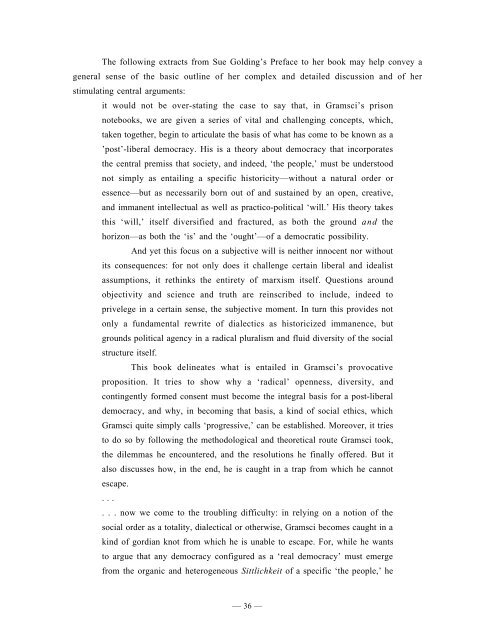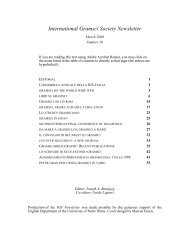Newsletter - International Gramsci Society
Newsletter - International Gramsci Society
Newsletter - International Gramsci Society
You also want an ePaper? Increase the reach of your titles
YUMPU automatically turns print PDFs into web optimized ePapers that Google loves.
The following extracts from Sue Golding’s Preface to her book may help convey a<br />
general sense of the basic outline of her complex and detailed discussion and of her<br />
stimulating central arguments:<br />
it would not be over-stating the case to say that, in <strong>Gramsci</strong>’s prison<br />
notebooks, we are given a series of vital and challenging concepts, which,<br />
taken together, begin to articulate the basis of what has come to be known as a<br />
’post’-liberal democracy. His is a theory about democracy that incorporates<br />
the central premiss that society, and indeed, ‘the people,’ must be understood<br />
not simply as entailing a specific historicity—without a natural order or<br />
essence—but as necessarily born out of and sustained by an open, creative,<br />
and immanent intellectual as well as practico-political ‘will.’ His theory takes<br />
this ‘will,’ itself diversified and fractured, as both the ground and the<br />
horizon—as both the ‘is’ and the ‘ought’—of a democratic possibility.<br />
And yet this focus on a subjective will is neither innocent nor without<br />
its consequences: for not only does it challenge certain liberal and idealist<br />
assumptions, it rethinks the entirety of marxism itself. Questions around<br />
objectivity and science and truth are reinscribed to include, indeed to<br />
privelege in a certain sense, the subjective moment. In turn this provides not<br />
only a fundamental rewrite of dialectics as historicized immanence, but<br />
grounds political agency in a radical pluralism and fluid diversity of the social<br />
structure itself.<br />
This book delineates what is entailed in <strong>Gramsci</strong>’s provocative<br />
proposition. It tries to show why a ‘radical’ openness, diversity, and<br />
contingently formed consent must become the integral basis for a post-liberal<br />
democracy, and why, in becoming that basis, a kind of social ethics, which<br />
<strong>Gramsci</strong> quite simply calls ‘progressive,’ can be established. Moreover, it tries<br />
to do so by following the methodological and theoretical route <strong>Gramsci</strong> took,<br />
the dilemmas he encountered, and the resolutions he finally offered. But it<br />
also discusses how, in the end, he is caught in a trap from which he cannot<br />
escape.<br />
. . .<br />
. . . now we come to the troubling difficulty: in relying on a notion of the<br />
social order as a totality, dialectical or otherwise, <strong>Gramsci</strong> becomes caught in a<br />
kind of gordian knot from which he is unable to escape. For, while he wants<br />
to argue that any democracy configured as a ‘real democracy’ must emerge<br />
from the organic and heterogeneous Sittlichkeit of a specific ‘the people,’ he<br />
— 36 —



